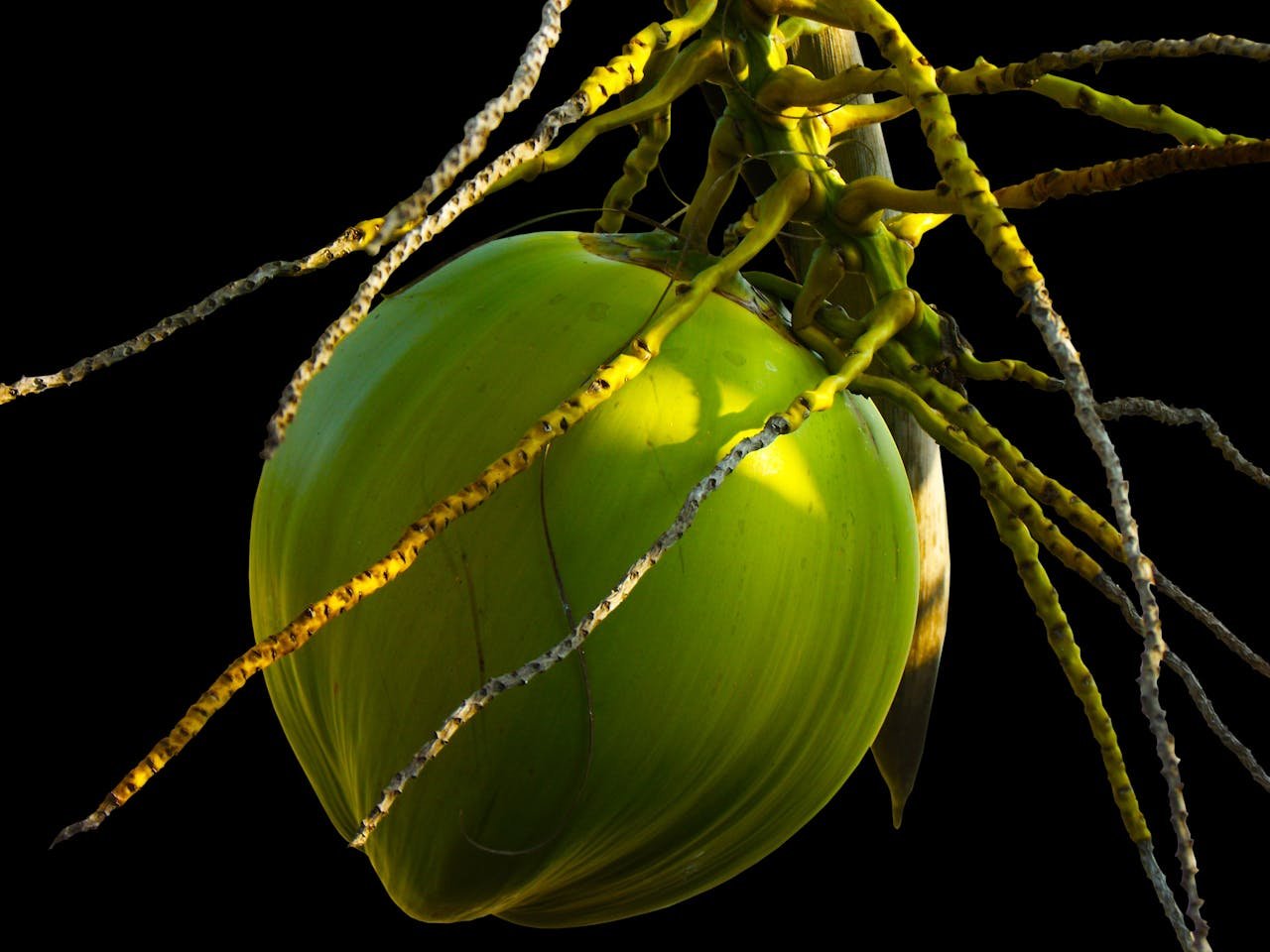Coconuts
Coconuts (Cocos nucifera) is a tropical fruit that is botanically classified as a drupe, which is a fruit with a hard outer shell enclosing a seed. It is the fruit of the coconut palm tree. The coconut palm tree is highly versatile and is often referred to as the “tree of life” due to the various uses of its different parts.
The coconut fruit has a large, fibrous, brown outer husk, which encloses a hard shell. Inside the shell is the white, edible flesh called the coconut meat. Coconut meat is rich in healthy fats, dietary fiber, and nutrients such as manganese, copper, and iron. It has a tropical, slightly sweet taste and a firm texture.
Another important component of the coconut is the coconut water, which is a clear liquid found inside the young, green coconuts. Coconut water is refreshing and have hydrating properties. It is low in calories, fat-free, and contains electrolytes, vitamins, and minerals such as potassium and magnesium.
Coconut is widely used in many cuisines around the world. The meat can be consumed fresh or used in both sweet and savory dishes, such as curries, desserts, and baked goods. Coconut oil, which is extracted from the meat, is used for cooking, baking, and frying in many tropical regions. The oil is also use to make skincare and hair care products due to its moisturizing properties.
In addition to the culinary uses, the coconut tree provides other valuable products. The husk fibers is use to make ropes, mats, and other products, and the shells are often craft into decorative items. The leaf of coconut tree is use to thatch roofs, and the trunk is also utilize as timber. The versatility of the coconut makes it an essential resource in many tropical regions worldwide.
Exploring the Different Types of Coconuts
Coconuts is a versatile fruits that have rich flavor, health benefits, and is use in numerous culinary uses. While many people are familiar with the standard coconut found in supermarkets, there are actually several types of coconuts, each with unique characteristics. In this post, we will explore the various types of coconuts and their specific uses.
1. Green Coconut
Green coconuts are the immature form of the fruit, typically harvested when they are about six to seven months old. These coconuts are known for their refreshing coconut water, which is a popular natural beverage. The water is hydrating and low in calories, making it a great alternative to sugary drinks. Additionally, the flesh of green coconuts is soft and jelly-like, perfect for smoothies or desserts. Researchers have shown that coconut water contains electrolytes, making it a natural sports drink.
2. Brown Coconut
Brown coconuts are the mature form of the fruit, often found in grocery stores. They have a hard, brown shell and contain both coconut water and white, firm flesh. The water in brown coconuts is less sweet than that of green coconuts and is usually use in cooking and baking. The flesh can be grated, shredded, or eaten fresh, providing a rich source of healthy fats. Studies indicate that the meat of brown coconuts is rich in medium-chain triglycerides (MCTs), which can help in weight management and boosting metabolism.
3. Dwarf Coconut
Dwarf coconuts are a smaller variety that grows on shorter palms. They are typically cultivated for their ornamental value and for producing coconut water. This type of coconut matures more quickly than the taller varieties, usually within three to five years. Dwarf coconuts are prized for their sweetness and are often used in tropical beverages. Furthermore, the coconut water from dwarf coconuts has been noted for its unique taste and higher sugar content.
4. Tall Coconut
Tall coconuts are characterized by their height, reaching up to 30 meters. This type of coconut takes longer to mature, usually around six to eight years. Tall coconuts are more commonly grown in tropical regions and are valued for their versatility. They produce both coconut water and meat, which can be used in a variety of culinary applications. In addition to their food uses, tall coconuts are also harvested for their oil, which is used in cooking and cosmetics.
5. Hybrid Coconut
Hybrid coconuts result from cross-breeding dwarf and tall varieties to combine desirable traits. These hybrids often yield coconuts with high water content and flesh quality while maturing more quickly than their tall counterparts. Farmers favor hybrid coconuts for their productivity and resilience against pests and diseases. Research suggests that hybrid coconuts can significantly increase the income of smallholder farmers by improving yields.
In conclusion, understanding the different types of coconuts enhances our appreciation for this remarkable fruit. From the refreshing green coconut to the versatile brown coconut, each variety offers unique flavors and uses. Whether you enjoy coconut water, meat, or oil, incorporating these different types into your diet can provide numerous health benefits.
By exploring the types of coconuts, we can not only enjoy their flavors but also understand their contributions to our health and the economy. So next time you come across a coconut, consider its type and how it can enhance your culinary experience.
Nutritional Value of Coconut
Coconuts are not only delicious but also packed with nutrients. Here’s a breakdown of the nutritional value of coconut, focusing on different forms such as raw coconut meat, coconut water, and coconut milk.
Nutritional Value of Coconut (per 100 grams)
1. Raw Coconut Meat (Fresh):
- Calories: 354
- Carbohydrates: 15.2 g
- Sugars: 6.2 g
- Dietary Fiber: 9 g
- Protein: 3.3 g
- Fat: 33.5 g
- Saturated Fat: 29.7 g
- Monounsaturated Fat: 1.4 g
- Polyunsaturated Fat: 0.4 g
Vitamins:
- Vitamin C: 3.3 mg (5% DV)
- Folate: 24 µg (6% DV)
- Vitamin E: 0.24 mg (2% DV)
Minerals:
- Potassium: 356 mg (10% DV)
- Magnesium: 32 mg (8% DV)
- Phosphorus: 268 mg (27% DV)
- Calcium: 18 mg (2% DV)
- Iron: 2.4 mg (13% DV)
2. Coconut Water:
- Calories: 19
- Carbohydrates: 3.7 g
- Sugars: 2.6 g
- Protein: 0.7 g
- Fat: 0.2 g
- Vitamin C: 5 mg (8% DV)
- Potassium: 250 mg (7% DV)
- Sodium: 105 mg (4% DV)
- Calcium: 24 mg (2% DV)
- Magnesium: 25 mg (6% DV)
3. Coconut Milk (Canned, unsweetened):
- Calories: 230
- Carbohydrates: 6 g
- Sugars: 3 g
- Dietary Fiber: 0 g
- Protein: 2.3 g
- Fat: 24 g
- Saturated Fat: 21 g
- Vitamin C: 0 mg
- Folate: 5 µg (1% DV)
- Potassium: 645 mg (18% DV)
- Calcium: 40 mg (4% DV)
- Iron: 2.3 mg (13% DV)
- Magnesium: 40 mg (10% DV)
Conclusion
Coconuts offer a variety of nutritional benefits, making them a valuable addition to a balanced diet. Whether consumed as raw coconut meat, refreshing coconut water, or creamy coconut milk, they provide essential nutrients and health benefits. However, due to their high saturated fat content, moderation is key, especially for those monitoring their fat intake.
Health Benefits of Eating Coconut
Eating coconut, including its flesh, water, and oil, offers several potential health benefits due to its nutrient content. Here are some of the health benefits associated with consuming coconut:
1. Nutritional Value
Coconuts are nutrient-dense, providing essential vitamins and minerals. They contain a good amount of dietary fiber, which is crucial for digestive health. Additionally, coconuts are a rich source of vitamins C and E, as well as several B vitamins, including B6 and folate, minerals (including potassium, manganese, and copper), and beneficial plant compounds like polyphenols. These nutrients work synergistically to support various bodily functions, including immune response and skin health.
2. Heart Health
The unique fat composition of coconut can benefit heart health. Although coconuts contain saturated fats, they are primarily made up of medium-chain triglycerides (MCTs), such as lauric acid, which may help raise HDL (good) cholesterol levels and improve the total cholesterol profile. Research indicates that MCTs may help reduce fat storage and promote weight loss, ultimately benefiting cardiovascular health. Moreover, coconut oil has been shown to raise HDL (good) cholesterol levels, which can lower the risk of heart disease.
3. Hydration
Coconut water is a natural and electrolyte-rich drink that can help rehydrate the body. It contains essential minerals such as potassium, magnesium, sodium, and calcium, making it a great choice for replenishing electrolytes after exercise or during hot weather.
4. Immune System Support
Coconuts are also known for their antiviral, antibacterial, and antifungal properties. Lauric acid, a type of saturated fat found in coconut oil, converts into monolaurin in the body, which has been shown to combat various pathogens. Incorporating coconut into your diet may help strengthen your immune system, making you more resilient to infections.
5. Weight Management
Coconut can be beneficial for weight management. The MCFAs in coconut oil are metabolized differently than long-chain fatty acids, potentially increasing feelings of fullness and boosting metabolism. Additionally, coconut flesh and oil contain dietary fiber that can contribute to satiety and promote healthy digestion.
6. Improved Digestion
The high fiber content in coconut promotes healthy digestion. Fiber aids in regular bowel movements, prevent constipation and promotes the growth of beneficial gut bacteria. Additionally, the medium-chain fatty acids found in coconut can enhance nutrient absorption, ensuring your body effectively utilizes the vitamins and minerals in your diet.
7. Promotes Healthy Skin and Hair
Coconut oil is widely used in skincare products due to its moisturizing properties. When applied topically, it can help improve skin hydration, reduce inflammation, and protect against damage caused by sun exposure. Its antibacterial properties help to prevent skin infections, while its hydrating qualities keep the skin supple. Consuming coconut products may provide some beneficial effects for hair health. Additionally, using coconut oil as a hair treatment can enhance shine and reduce protein loss, contributing to overall hair health.
8. Antioxidant and Anti-inflammatory Effects
Coconut contains various antioxidants and polyphenols that can help reduce oxidative stress and inflammation in the body. These properties may contribute to overall health and potentially reduce the risk of chronic diseases.
It’s important to note that while coconut offers several potential health benefits, moderation is key due to its high calorie and fat content. It’s also worth considering individual preferences and needs, as well as any specific dietary restrictions or health conditions. Consulting with a healthcare professional or registered dietitian is recommended for personalized advice.
Uses of Coconut
Coconuts are versatile fruits that have numerous uses. Here are some common uses of coconuts:
1. Food and Cooking
- Coconut water: The clear liquid inside the coconut is known as coconut water and is a popular refreshing drink.
- Coconut milk: It is extracted from the grated flesh of mature coconuts and is used in various dishes, desserts, and curries.
- Coconut oil: Extracted from the meat of mature coconuts, coconut oil is used for cooking, baking, frying, and as a flavoring.
- Coconut flesh: The white, edible part of the coconut is used in shredded or grated form in many recipes, including desserts, smoothies, and curries.
2. Cosmetics and Beauty Products
- Coconut oil: It is widely used in skincare and hair care products due to its moisturizing properties and ability to nourish the skin and hair.
- Coconut milk: Used in soaps, lotions, and shampoos for its hydrating and soothing properties.
- Coconut water: Sometimes used as an ingredient in beauty products due to its hydrating and refreshing qualities.
3. Medical and Wellness
- Coconut oil: Used in traditional medicine and natural remedies for its potential health benefits, such as improved digestion and boosting the immune system.
- Coconut water: Due to its natural electrolyte content, it is sometimes used as a rehydration drink for dehydration.
- Coconut oil pulling: A traditional method of using coconut oil as a mouthwash to improve oral health.
4. Industrial Uses
- Coconut coir and husk: The fibrous material obtained from the husk is used to make various products like mats, brushes, ropes, and doormats.
- Activated carbon: Produced from coconut shell charcoal, it is used in water filters, air purifiers, and industrial applications.
5. Household and Crafts
- Coconut shells: Can be used as bowls, planters, or decorative items.
- Coconut leaves: Used for thatching roofs, making baskets, mats, and as a material for artistic and craftwork.
6. Agriculture and Horticulture:
- Coconut husk and fiber: Used as a growth medium in horticulture, particularly for orchids and other tropical plants.
- Coconut shell charcoal: Used as a soil amendment and in horticultural applications.
These are just a few examples of the many uses of coconuts.
Side Effect of Eating Coconut
Coconut is a versatile fruit that offers several health benefits, but it can also have side effects, particularly if consumed in excessive amounts or in certain circumstances. Here are some potential side effects of eating coconut:
1. High-calorie content
Coconuts are relatively high in calories due to their high fat content. Consuming large quantities of coconut or coconut-based products, such as coconut oil or milk, without considering your overall calorie intake, can lead to weight gain or hinder weight loss efforts.
2. Digestive issues
Some individuals may experience digestive problems after consuming coconut products. This can include symptoms like bloating, abdominal cramps, diarrhea, or constipation. These issues are usually rare, but if you notice any discomfort after eating coconut, it may be best to reduce your intake or avoid it.
3. Allergic reactions
Coconut allergies are uncommon but can occur in some individuals. Symptoms of a coconut allergy can range from mild to severe and include itching, hives, swelling, difficulty breathing, or even anaphylaxis. If you suspect an allergy, it’s essential to seek medical attention.
4. Increased cholesterol levels
Although coconut is often praised for its healthy fats, it mainly contains saturated fats, which can raise low-density lipoprotein (LDL) cholesterol levels when consumed in excess. This, in turn, may contribute to an increased risk of heart disease, so moderation is key.
5. Interference with medication
Coconut products, particularly coconut water or oil, can interact with certain medications. For example, the high potassium content in coconut water can affect individuals with kidney problems or those taking medications that affect potassium levels. It’s important to consult your healthcare provider if you have any concerns about potential interactions.
6. Excessive fiber intake
Coconut meat and flour are good sources of dietary fiber. While fiber is generally beneficial for digestive health, consuming excessive amounts of coconut-based fiber can lead to bloating, gas, or diarrhea, particularly if your body is not used to a high-fiber diet. Gradually increasing fiber intake and drinking plenty of water can help minimize these effects.
It’s essential to note that not everyone will experience these side effects, and they often occur when coconut is consumed in excessive amounts or if there are underlying health conditions or allergies. Moderation and awareness of your individual circumstances are crucial for incorporating coconut into your diet safely. If you have any specific concerns, it’s recommended to consult with a healthcare professional or registered dietitian.
Reference
https://www.healthline.com/nutrition/coconut-nutrition
https://www.goodhousekeeping.com/health/diet-nutrition/a45965113/coconut-nutrition-benefits
https://www.goodhousekeeping.com/health/diet-nutrition/a45965113/coconut-nutrition-benefits





